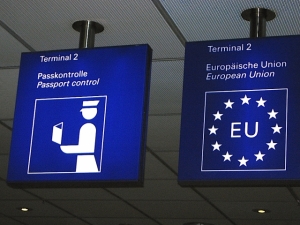Visa Free Travel with EU: Green Light to Georgia, but not for Unlimited Travel
Citizens of Georgia are already making holiday plans in the Schengen zone countries for this summer, following the fourth and final progressive report on the Visa Liberalization with Georgia and Ukraine issued by the EU Commission on December 18, 2015.
Although the EU authorities have given the green light to Georgian citizens to travel without visas in 26 countries of the bloc, this does not mean immediate unlimited travel.
The European Commission said both countries had carried out the reforms they promised to enact to win Brussels’ backing and they planned to make a formal legal recommendation in early 2016.
How Georgians benefit from a visa-free regime with Schengen zone countries
On Tuesday, Georgia Today Business published details of a survey by the Caucasus Research Resource Center (CRRC) about the attitude and awareness of Georgians of the expected visa liberalization process. The survey highlighted that most Georgians (56%) do not have proper information and knowledge about the visa liberalization process.
The Director of the Regional Center for Strategic Studies (RCSS), Mikheil Mirziashvili, believes that visa-free travel will ease “tough” visa requirement procedures for Georgian citizens and especially for people who are living in Georgia’s regions, who have to travel hundreds of miles to apply for a visa in Tbilisi consulates, and then return later to collect their passports once a decision has been made. This involves additional financial expenses.
Mirziashvili says the changes will lead to an end of such degrading practices at the Tbilisi-based European consulates. Hours, sometimes even days, standing in a queue for a visa, expensive visas on the black market, in some cases corruption – at one hit, all this is to belong to the past.
“Georgians will feel relief from unpleasant visa procedures. Soon they will not have to plan travel in Shengen zones years and months ahead of time. But it’s important to bear in mind that it in no way gives Georgians the right to work, study or become residents of Schengen area countries – for these purposes, a labor, study or immigration visa will be needed,” Mirziashvili said.
The Head of the RCSS emphasized that visa liberalization with the European Union does not abolish borders between Georgia and the EU, but makes it easier to cross.
“This does not guarantee our instant membership to the EU, even if we have successfully fulfilled the Association Agreement (AA) with the EU signed in June 2014. For Georgia, this is a process to become a country like European Union members are. We need to build our State like an EU country in economic, social and human rights areas and only then will we be able to make the fairly ambitious request for EU membership,” he said.
The Republic of Moldova as an example
With regards potential immigration threats if Georgian citizens are allowed to travel visa-free in the Schengen bloc, most experts bring Moldova as a successful example.
The EU lifted the visa requirements for Moldovan citizens in April, 2014. According to data from the Moldovan border police, since this period, over 241,000 holders of Moldovan biometric passports left for EU countries and 90 percent of them have already returned to Moldova.
Mirziashvili emphasized that visa-free travel will regulate the illegal flow of Georgian citizens to the EU. The free visa deal requires the Georgian side to strengthen border control and ensure proper regulations on illegal immigration.
“In this case, post-soviet Moldova is very similar to Georgia. We have almost the same populations (3,559 mln). As I know, only 800 persons attempted to stay in Europe illegally after Moldavians got visa-free travel. According to unofficial information, around a million Georgians have already illegally lived in the EU, thus I do not expect that after visa liberalization, the number of illegal immigrants from Georgia will increase,” he said.
The Russian Factor
Late December, Russia’s Deputy Foreign Minister Grigory Karasin said that Russia, which backs Georgia’s separatist regions of Abkhazia and South Ossetia, is ready to suggest visa-free access for Georgian citizens, following the positive report by the European Commission.
“Russia’s integration strategy, which it has toward territories of post-soviet countries, could not compete with the politics of the EU in Eastern Partnership countries, if it does not contain security threats. We have Armenia, which also wanted to sign an AA deal with the EU, but as three years of negotiation were in vain, Armenia joined the Russian-lead Customs Union in January 2015. Georgia can expect more political pressure in the coming years,” Karasin said.
Georgian expert believes that pro-Russian propaganda plays a significant role regarding Georgian citizen’s lack of information about the visa liberalization process.
Visa Liberalization, the Background
The visa liberalization agreement between Georgia and the EU was launched in June, 2012, and is expected to enter into force in summer 2016, allowing Georgian citizens holding biometric passports to enter and stay in Schengen area countries without a visa for up to 90 days in a 180-day period.
In February 2013, the Visa Liberalization Action Plan (VLAP) was presented to Georgian authorities.
The European Commission’s December 2015 progress report stated that “given the outcome of the continuous monitoring and reporting carried out since the launch of the EU-Georgia Visa Liberalization Dialogue, the Commission considers that Georgia meets all the benchmarks set in respect of the four blocks of the second phase of the VLAP.”
Tamar Svanidze












